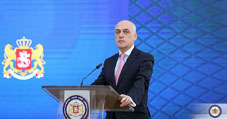
FM Minister Zalkaliani presents 10-year action plan
By Khatia Bzhalava
Wednesday, August 11
On Monday, Georgian Foreign Affairs Minister David Zalkaliani presented a 10-year action plan and 10 main goals of his ministry, focusing on western values and the country’s interests.
The minister opened the event with the discussion of the 13th anniversary of the 2008 Russian-Georgian war and stressed that 13 years ago Russian forces attempted to forcibly change the state borders of a sovereign country. The minister also spoke about the challenges created as a result of occupation across Georgia.
“Our Abkhaz and Ossetian citizens are deprived of the opportunity to enjoy Georgia’s important achievements, and primarily of the benefits, Georgia derives from democratization, development, European and Euro-Atlantic integration,” Zalkaliani noted.
As FM stated, the government of Georgia does its utmost to ensure the de-occupation and unification of the country, peaceful resolution of the conflict, and reconciliation of the communities torn apart by the occupation lines. “It is unacceptable and inconceivable that in the 21st century the occupying force is building new Berlin walls in Georgia, to the east of Europe,” the FM said.
According to Zalkaliani, foreign policy focuses on Western values and the country’s interests. The ministry's action plan - ’10-year vision, 10 goals’ includes the de-occupation process, which must begin by 2030 and ‘its course should be irreversible’.
As the minister stated, the country must make an application for membership in the EU by 2024 and should receive the status of candidate for membership by 2030.
The Government of Georgia intends to ensure the implementation of a plan developed together with the Alliance to achieve Georgia’s eventual membership in NATO.
As part of the 10-year action plan, Georgia aims to establish a comprehensive alliance between the United States and Georgia based on a ‘firm U.S.-Georgia strategic partnership, reinforced by military-political and trade-economic components’. As FM stated, it is important to promote the security of the Black Sea region on the US agenda and establish the US as the main ally in the region. He noted that the cooperation will focus on global challenges, including international health and hybrid warfare, as well as climate change and counterterrorism, cybersecurity, and the introduction of 5G technologies.
The action plan also envisages upgrading the high-level formats of bilateral relations to a new strategic level, which will ‘contribute to the country’s European and Euro-Atlantic integration process, ensuring security, creating a politically stable, democratically sound and economically successful state in the East European region,” Vice PM Zalkaliani stated.
The plan includes establishing the South Caucasus as an area of cooperation, good neighborhood, and dynamic development by pursuing a partnership-oriented and mutually beneficial regional policy. Zalkaliani stressed the importance of strengthening relations with three neighboring countries Azerbaijan, Armenia, and Turkey.
The FM also stressed the importance of normalizing political relations with Russia under the principle of de-occupation and the territorial integrity of Georgia.
The Georgian government plans to establish the EU-Georgia connectivity dialogue, which will contribute to establishing Georgia as a regional leader with the function to become a bridge connecting the East and the West. Zalkaliani stressed the importance of the Eastern Partnership Economic and Investment Plan of the EU which offers Euro3.9 billion to help Georgia improve transport and logistics connectivity.
According to Zalkaliani, up to 1.5 billion USD of foreign direct investment has been attracted to the Georgian economy since 2012. Based on the action plan, Georgia aims to increase foreign investment opportunities and to implement national, regional, and international transport, energy, and investment projects.
Zalkaliani noted that it is important for Georgia to have further strengthened diaspora by 2030 with successful cultural and educational centers abroad. According to him, to achieve this goal, effective communication will be ensured between the state and compatriots living abroad.
According to the Foreign Minister, this is the first time in the history of the ministry that a 10-year plan was developed to determine where Georgia should be in 10 years.


